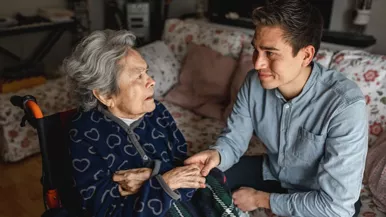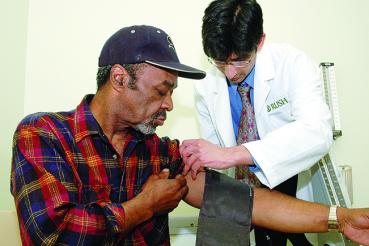Caring for an aging family member often comes up suddenly, with no time to prepare and no training. Often, the caregiver quickly becomes exhausted and overwhelmed.
To support family caregivers, Rush social workers created Caring for Caregivers, a model program that is being shared with hospitals and agencies on aging across the U.S.
“It can be very hard to realize how much work it is to be the family caregiver — and how hard it is to care for yourself while you’re taking care of someone else,” said Stephanie Bailey, LSCW, program coordinator.
While every caregiver’s experience is unique, nearly all face common challenges and questions. They may be asked to handle complex medical tasks such as introducing new medications, managing feeding and oxygen machines and other equipment, handling wound care and changing dressings. Many caregivers have chronic health problems themselves that need attention.
“Caregivers seldom are asked how they are doing or what they need,” she said.
That’s why Rush’s program provides caregivers with training on home care tasks, as well as counseling and support in handling stress, improving communication and connecting with others.
Bailey works closely with caregivers and offered her top seven tips for people taking on the role:
- Let the health care team know that you will be the one managing the patient’s care at home, and that you are the first contact. Ask to be put in the family member’s medical record as the caregiver.
- Ask to speak with the social worker or charge nurse before you leave the hospital, so you can go over the care plan and make sure you understand everything you need to know. Don’t be afraid to ask, even if the staff seems in a hurry for you to leave.
- Ask the medical staff how to handle equipment as well as tasks that are new to you, like taking blood pressure or helping the patient feed themself. Note what you should expect and what you should watch for.
- Get organized right away. Gather the names and phone numbers you will need, such as your contacts at the hospital, and keep adding in others, such as a paid care provider or a visiting nurse. Keep an updated list of their names, their duties and their phone numbers. “Caregivers often tell us that they feel really overwhelmed by the number of phone calls they get and that it’s helpful to have this list handy,” Bailey said. “It’s especially important when you’re exhausted, when it’s much harder to keep track of things.”
- Take care of yourself. Right from the start, you need to stay hydrated and keep on schedule with eating. Then listen to your body and sleep when you need to. “Remember to take time, even a minute or two, for something that gives you joy or peace, something that provides the tiniest bit of a break,” Bailey said. “Look at a beautiful piece of art or listen to a favorite song.”
- Stay connected with family, friends and social groups. “It’s crucial that you not let yourself become isolated,” she said. Talk with a friend. Talk with a therapist. Seek out a support group. One resource is Alz.org, which has a list of caregiver supports groups. Take part in a program like Caring for Caregivers.
- Tap into resources:
• Reach out to Area Agencies on Aging, the national nonprofit network, which has more than 900 locations searchable by ZIP code or city. The local office will know what services are available and help you find resources.
• For questions about understanding insurance coverage, the federal Senior Health Insurance Program provides free help understanding your family member’s coverage, medical bills and other costs.
• Turn to family members and friends who would take on tasks, too, like looking up transportation options, food and meal delivery programs and other services. For example, you could ask a niece or nephew to look up the local Meals on Wheels.
“People often are afraid to ask for help, fearing they will be a bother or that the answer will be no,” Bailey said. “The role is a big adjustment. Don't feel bad asking for help.”




